'I’m homeless but I find great places to live'
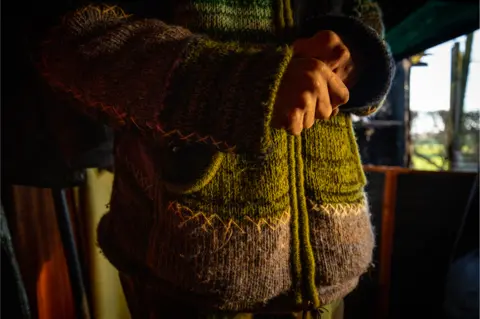 BBC
BBC
Stewart has been homeless for most of his adult life. He's slept in shop doorways, church porches and on railway platforms, but also - he says - in some "great places". He now lives on an abandoned allotment in North Yorkshire, and has no desire to live in a house or flat again. Although he has ambitious plans for the future, he's content with his life as it is.
The old pigeon shed where Stewart has lived since June last year is a patchwork of chicken wire, wood and plastic tarpaulins. Around it the bramble bushes are thriving, but the plants in the raised beds have long gone to seed and the dilapidated greenhouses look beyond repair. Wooden pallets and a rusting bike frame lie in a tangle next to water drums and scaffolding poles.
Stewart doesn't think this allotment has been used for four or five years, but spades and forks still stand in the earth, as though whoever used to work this soil might just have downed tools for a tea break.
It was a few weeks after first arriving in Whitby, while walking his border collie, Cariad, on the Cinder Track - the old Scarborough to Whitby railway line, which closed more than 50 years ago - that Stewart came across this place and set about making it his home.

Inside the shed, the low winter sun pours in through the corrugated plastic that Stewart used to replace the broken window panes. He's lined the floor and some of the walls with insulating boards that he salvaged from a skip, and built himself a bed - his army surplus Arctic sleeping bag is laid out neatly on top.
Soon after he'd settled in, Stewart had a visit from some curious police officers. They sniffed around, asked some questions, and returned later with some gifts - a smoke detector and a carbon monoxide alarm.
There's no electricity or running water but Stewart has installed a wood-burning stove and washes every morning in water from a large container he occasionally refills and pulls behind his bicycle on a trailer. He has battery-powered lamps and a pile of books is stacked on the floor at the foot of his bed, among them a mushroom-spotting field guide, and a Penguin Vintage Classic, Love On The Dole.
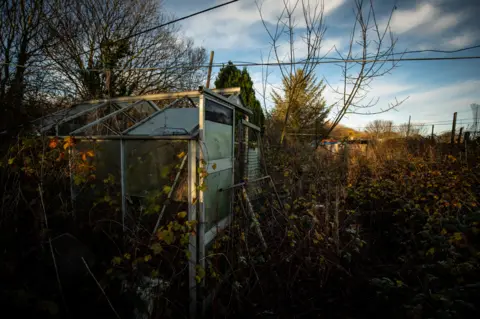

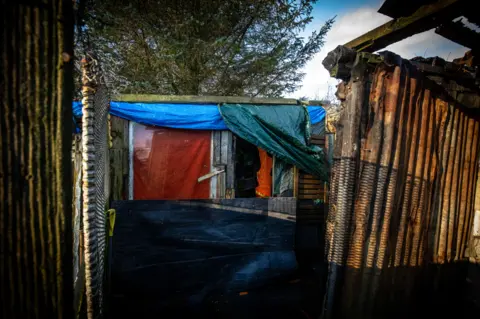
"If you have a good book, a radio, you are warm and you are safe, you can close your eyes and be anywhere," Stewart says. "It doesn't matter if you are homeless or living in a palace - it's all in the mind."
Stewart does feel safe here, but from long habit he takes the precaution of leaving his sleeping bag unzipped.
"I've been dragged down Cardiff Queen Street in my sleeping bag and I couldn't get out because it was zipped up," he tells me. "And if someone comes along and sets you on fire, you can't get out and that's it… So you just never do your sleeping bag up."

Stewart's eyes were opened to the possibility of making a place that feels like home, despite being "homeless", about 15 years ago, when he was 26.
He was squatting in Cardiff when he heard about a group of travellers living on the outskirts of the city, across the River Ely in Leckwith Woods. They'd built shelters known as benders from the branches of hazel and willow trees dug into the ground and curved to form arches. They had a treehouse, a teepee, an army tent, a generator and a kitchen sink plumbed into a spring, bringing clean running water straight up through the mud.
"When I saw this stuff it really put an idea into my head about how you can simplify things and still have a great life," he says.
Stewart spent about five years there. For a while he gave up his mobile phone, and didn't claim any benefits. He went "off-grid".
"I just wanted to see what it would be like to live as a free man on the land," he says, "and I absolutely loved it, it was liberating."

When the site was destroyed - Stewart suspects by the electricity company that came periodically to lop branches growing too close to pylons - he moved on. But he has been looking for somewhere to match that woodland home ever since, and sometimes he succeeds.
"I've found I have skills in finding great places," he says.
There was a "stunning place" in Worcester - the wheel-less rear section of a removals lorry, rather like a shipping container, which backed on to Worcester Arena. There was an empty stable on a racecourse, also in Worcester. And, more recently, a roundabout in Darlington, where he lived undisturbed in a bell tent surrounded by hedges for 10 months.
The housing charity, Shelter, says there are about 320,000 homeless people in the UK, though this figure does not include "hidden" forms of homelessness, such as people sofa-surfing with friends. Stewart would be classified by the government as a "rough sleeper", as he lives in "buildings or other places not designed for habitation". According to the latest official figures, there were 4,700 rough sleepers in England in autumn 2018, including 250 in Yorkshire and the Humber.
In the morning Stewart tends to wake early - in summer at least.
"I don't have any curtains so I generally wake as soon as the sun comes up. That's about eight o'clock just now, but during the summer I could be up at four in the morning - you just get used to getting up when it's light and going to bed when it's dark," he says.


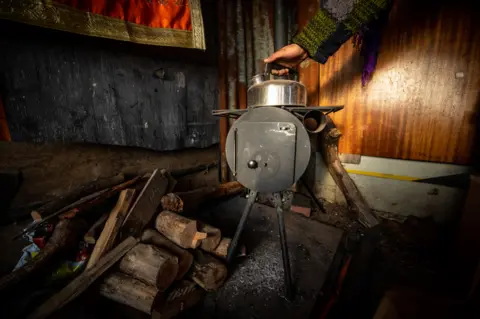
One of his main occupations is collecting driftwood from the beach, to use as fuel. He jokingly refers to the wood-burner as his television.
"It only plays the one channel, but who doesn't love watching logs burn?" he says.
He explains which types of wood burn best, and which smell nicest as they burn - cherry is incredible, he says, but his favourite is birch.
Stewart isn't claiming any benefits at the moment, so he doesn't have to sign on, but he does have to earn money, and he does this by busking.
I follow him and Cariad to Baxtergate, the main shopping street in town, where he takes up his usual spot, next to the old newsagents and opposite a busy, brightly lit bakery.

"Lovely guys in there," Stewart says, pointing. "They do these amazing apple pasties."
He hasn't even taken his ukulele out of its bag when an elderly woman stops, chats for a moment and presses a folded up fiver into his hand. She's a regular, he tells me later, and probably gives him that amount most weeks.
"Sometimes people try to give me more than that, but if I don't know their situation I won't take it," he says.
Stewart can make ten or twenty quid playing songs by Radiohead, The Smashing Pumpkins and Green Day for an hour or so. Some days, when the Steampunk or Goth Weekends are on and the town is heaving, he makes much, much more, he tells me.
But it's not just about the money. This is his opportunity to chat to people, and the people here are mostly friendly - unlike some he's met during his years on the streets.



There were the drunks who urinated on him as he slept, and the "nice" men who'd approach him on cold nights offering him somewhere warm to stay, only to turn predatory once indoors.
"That sort of thing happens all the time," he says.
There was the man from the shop in a Welsh market town who gave him a day's work stuffing envelopes, then got him so hammered he passed out.
"The next thing I remember, I was waking up at three o'clock in the morning, and he was on top of me," Stewart says. "I managed to get him off and nothing happened, but he knew I was a 16-year-old - he was getting me drunk and trying to groom me."
And there was the time he was abducted and forced to work on a travelling fairground for six months - they kept him in a caravan when he wasn't working, beat him and threatened him with violence - he still finds that almost unbearable to think about even now, 20 years on.


Part of a mini-series of downloadable guides to the big issues in the news, the housing briefing has input from academics, researchers and journalists and is the BBC's response to demands for better explanation of the facts behind the headlines.

Brought up in Southampton, Stewart was fostered at the age of 13 after being sexually abused by his mother's partner and physically abused by her next boyfriend. The first of four children, he was the only one taken into care and has no contact with his brother, sisters, mother, or father. He's been on his own since leaving care at the age of 16 and has been homeless for most of the intervening 25 years.
"I'm the only reliable person in my life," he says.
- Briefing: There are many causes of homelessness
The first drug he tried, at 15, was LSD. Around that time he also got his first conviction, for breaking into a shop and emptying it of chocolate.
Later he became dependent on cannabis - though now he doesn't touch it - and he has a string of further convictions, including one for assaulting an ex-girlfriend. He hasn't had a partner since.
"I'm not very good at relationships at all," he says. "I struggle with stuff like that."
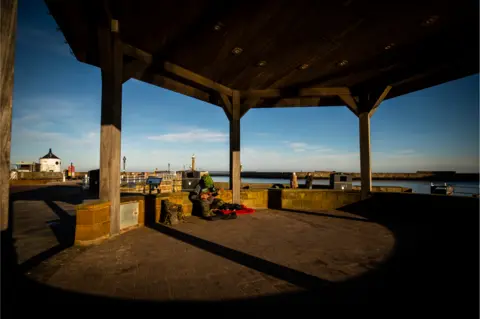
Between the ages of 17 and 19 Stewart walked from Sussex to Aberystwyth, then walked down the coast of Wales doing odd jobs as he went. Later he made a thorough exploration of Norfolk, Suffolk and Essex, visiting every single Church of England church - thousands of them.
He doesn't move around so much now, but he's reached a stage, he says, where he doesn't even want to live in a house.
"People come up to me and they're like, 'I don't know how you do it.'" he tells me.
"And I say to them, 'I don't know how you do it.'"
Applying for benefits would send his anxiety levels through the roof, Stewart says. He doesn't think he would be eligible for housing benefit in Whitby because he hasn't got a local connection, and anyway he wouldn't want to deal with neighbours or worry about paying bills. He's spent six or seven years of his adult life living like that, in shared places or council flats, and that was enough.

At the beach where Stewart usually gathers driftwood, we walk along the shoreline. He's brought a litter picker and a plastic bag from the lifeboat station to collect rubbish - today just a few cigarette ends and some tiny colourful pieces of plastic, worn down by the sea and left behind by the swash.
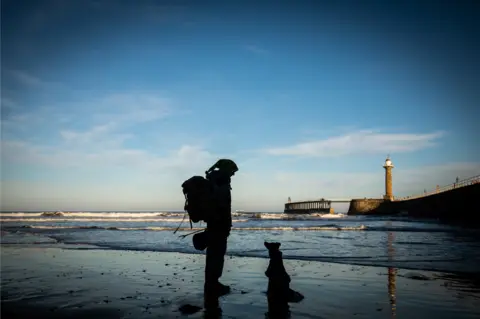
But Stewart also stops from time to time to pick slivers of tumbled sea glass from the wet sand. Blue is the hardest colour to find here, he says, but he really loves yellow. He thinks he'll make a wind chime with the big bits, and a mosaic mirror frame with the smaller ones.
"I love what the sea signifies," he says, as he looks out across the water towards the lighthouse.
"It signifies freedom - it goes where it wants to when it wants to. The only thing that has any power over it is the moon."

Stewart tells me he doesn't tend to eat during the day, but at a cafe in town he lets me buy him a coffee to which he adds three generous spoonfuls of sugar. He also orders a slice of lemon cake to have later.
"If you've got no money and you can only eat an evening meal then it's better to keep your system going just on that," he says.
He knows how to get referred to food banks, he knows which churches give out food parcels, and where the soup runs are, but he tries to only use them if he really needs to. If things get really tight, he says, there are other good people who will help him out - at the pie and mash shop and at one of the cafes - but he doesn't like to ask. He'd prefer to be independent.
"l am homeless," he says, "but I'm also car-less and lots-of-other-things-less - does that make me a charity case?"
In fact, Stewart wants to help other people.

He dreams of growing food on the allotments - not just for himself, but also for the local community. And he'd like to create a sensory garden, for people who are sight-and-hearing impaired or have learning disabilities, where plants and flowers, features and objects stimulate through touch, sight, scent, taste and hearing.
"This could be an amazing community resource," he says. "But I don't know if they will let me do it."
Stewart has other plans too. He wants to save to buy a yurt and he's had the idea of launching a pedicab business offering a taxi service for tourists from the town up to the ruined abbey that sits on a cliff above Whitby, overlooking the North Sea.

He understands, though, that he will never have a permanent home and that his life consists of moving from town to town "finding and then getting evicted from safe places".
Squatting in non-residential buildings or on land - as Stewart is doing - is not illegal in England and Wales. To remove a squatter the owner would have to get a court order.
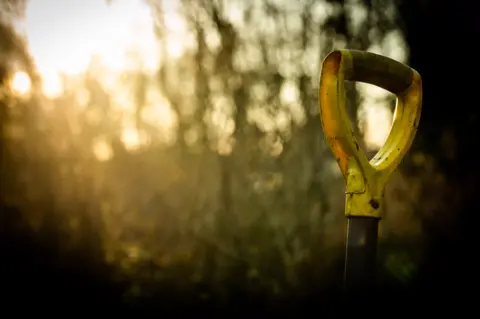
Stewart thinks the owner, in his case, could be the railway or the county council - he's heard conflicting reports. Whichever it is, he hopes that if they decide they want the allotment back, they'll allow him to stay until they're ready to redevelop it.
"And I'd be perfectly fine with that, absolutely fine," he says.
"I know my home could be taken away from me just like that, but people who are working can lose a home just like that as well.
"One door closes, another door opens."
Photography by Ceri Oakes
You may also be interested in:
 Getty Images
Getty ImagesFor more than two decades after his asylum application was rejected, Sunny found a safe haven aboard the buses that zigzag across London at night. What's it like to spend every night on the lower decks?
